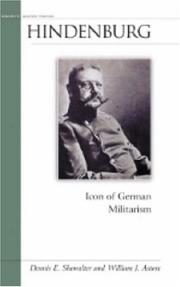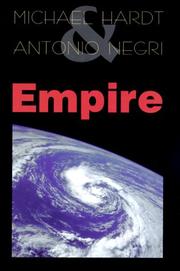| Listing 1 - 10 of 836 | << page >> |
Sort by
|

ISBN: 080146708X 1322500509 0801467098 9780801467097 9780801472930 0801472938 9780801442582 0801442583 9781322500508 9780801467080 Year: 2005 Publisher: Ithaca London
Abstract | Keywords | Export | Availability | Bookmark
 Loading...
Loading...Choose an application
- Reference Manager
- EndNote
- RefWorks (Direct export to RefWorks)
In a book that is at once a major contribution to modern European history and a cautionary tale for today, Isabel V. Hull argues that the routines and practices of the Imperial German Army, unchecked by effective civilian institutions, increasingly sought the absolute destruction of its enemies as the only guarantee of the nation's security. So deeply embedded were the assumptions and procedures of this distinctively German military culture that the Army, in its drive to annihilate the enemy military, did not shrink from the utter destruction of civilian property and lives. Carried to its extreme, the logic of "military necessity" found real security only in extremities of destruction, in the "silence of the graveyard."Hull begins with a dramatic account, based on fresh archival work, of the German Army's slide from administrative murder to genocide in German Southwest Africa (1904-7). The author then moves back to 1870 and the war that inaugurated the Imperial era in German history, and analyzes the genesis and nature of this specifically German military culture and its operations in colonial warfare. In the First World War the routines perfected in the colonies were visited upon European populations. Hull focuses on one set of cases (Belgium and northern France) in which the transition to total destruction was checked (if barely) and on another (Armenia) in which "military necessity" caused Germany to accept its ally's genocidal policies even after these became militarily counterproductive. She then turns to the Endkampf (1918), the German General Staff's plan to achieve victory in the Great War even if the homeland were destroyed in the process-a seemingly insane campaign that completes the logic of this deeply institutionalized set of military routines and practices. Hull concludes by speculating on the role of this distinctive military culture in National Socialism's military and racial policies.Absolute Destruction has serious implications for the nature of warmaking in any modern power. At its heart is a warning about the blindness of bureaucratic routines, especially when those bureaucracies command the instruments of mass death.
Militarism --- Antimilitarism --- Military policy --- Sociology, Military --- Chauvinism and jingoism --- Imperialism --- History. --- Germany --- History, Military
Book
Year: 1928 Publisher: London : Allen & Unwin,
Abstract | Keywords | Export | Availability | Bookmark
 Loading...
Loading...Choose an application
- Reference Manager
- EndNote
- RefWorks (Direct export to RefWorks)
Chauvinism and jingoism. --- National characteristics, English. --- Public opinion --- World War, 1914-1918 --- Causes.
Book
ISBN: 3902296011 Year: 2004 Publisher: Leuven KUL. Hoger instituut voor de arbeid
Abstract | Keywords | Export | Availability | Bookmark
 Loading...
Loading...Choose an application
- Reference Manager
- EndNote
- RefWorks (Direct export to RefWorks)
Chauvinism and jingoism --- Populism --- Public opinion --- Right-wing extremists --- Working class --- Attitudes
Digital
Year: 1722 Publisher: London Printed for A. Moore ...
Abstract | Keywords | Export | Availability | Bookmark
 Loading...
Loading...Choose an application
- Reference Manager
- EndNote
- RefWorks (Direct export to RefWorks)
Digital
Year: 1750 Publisher: London Printed for J. Robinson, R. Dodsley, and J. Sheepy
Abstract | Keywords | Export | Availability | Bookmark
 Loading...
Loading...Choose an application
- Reference Manager
- EndNote
- RefWorks (Direct export to RefWorks)
Book
ISBN: 0049090186 9780049090187 Year: 1986 Publisher: London : Allen and Unwin,
Abstract | Keywords | Export | Availability | Bookmark
 Loading...
Loading...Choose an application
- Reference Manager
- EndNote
- RefWorks (Direct export to RefWorks)
Imperialism --- Colonialism --- Empires --- Expansion (United States politics) --- Neocolonialism --- Political science --- Anti-imperialist movements --- Caesarism --- Chauvinism and jingoism --- Militarism --- Imperialism.

ISBN: 1612340636 1429490179 9781429490177 9781574886542 1574886541 9781612340630 1574886533 9781574886535 Year: 2005 Publisher: Washington, D.C. Potomac Books
Abstract | Keywords | Export | Availability | Bookmark
 Loading...
Loading...Choose an application
- Reference Manager
- EndNote
- RefWorks (Direct export to RefWorks)
Analyzes the storied career of one of Germany's most famous military leaders
Militarism --- Generals --- Presidents --- Antimilitarism --- Military policy --- Sociology, Military --- Chauvinism and jingoism --- Imperialism --- History. --- Hindenburg, Paul von, --- Germany --- Politics and government
Book
ISBN: 1438460147 9781438460147 9781438460130 1438460139 Year: 2016 Publisher: Albany
Abstract | Keywords | Export | Availability | Bookmark
 Loading...
Loading...Choose an application
- Reference Manager
- EndNote
- RefWorks (Direct export to RefWorks)
Employs Robert Bellah's notion of civil religion to explore East Asia's Confucian revival.
Confucianism --- Civil religion --- Religion, Civil --- Chauvinism and jingoism --- Nationalism --- Religion and culture --- Religion and state --- Religions --- Religious aspects

ISBN: 0674038320 9780674038325 0674251210 9780674251212 0674006712 9780674006713 Year: 2020 Publisher: Cambridge, MA
Abstract | Keywords | Export | Availability | Bookmark
 Loading...
Loading...Choose an application
- Reference Manager
- EndNote
- RefWorks (Direct export to RefWorks)
Imperialism as we knew it may be no more, but Empire is alive and well. It is, as Michael Hardt and Antonio Negri demonstrate in this bold work, the new political order of globalization. Their book shows how this emerging Empire is fundamentally different from the imperialism of European dominance and capitalist expansion in previous eras. Rather, today's Empire draws on elements of U.S. constitutionalism, with its tradition of hybrid identities and expanding frontiers. More than analysis, Empire is also an unabashedly utopian work of political philosophy.
Imperialism. --- Colonialism --- Empires --- Expansion (United States politics) --- Neocolonialism --- Political science --- Anti-imperialist movements --- Caesarism --- Chauvinism and jingoism --- Militarism
Book
ISBN: 1787358186 1787358194 Year: 2022 Publisher: London : Archaeopress Publishing Ltd,
Abstract | Keywords | Export | Availability | Bookmark
 Loading...
Loading...Choose an application
- Reference Manager
- EndNote
- RefWorks (Direct export to RefWorks)
Jeremy Bentham and Australia is a collection of scholarship inspired by Bentham's writings on Australia. These writings are available for the first time in authoritative form in Panopticon versus New South Wales and other writings on Australia, a volume in The Collected Works of Jeremy Bentham published by UCL Press. In the present collection, a distinguished group of authors reflect on Bentham's Australian writings, making original contributions to existing debates and setting agendas for future ones. In the first part of the collection, the works are placed in their historical contexts, while the second part provides a critical assessment of the historical accuracy and plausibility of Bentham's arguments against transportation from the British Isles. In the third part, attention turns to Bentham's claim that New South Wales had been illegally founded and to the imperial and colonial constitutional ramifications of that claim. Here, authors also discuss Bentham's work of 1831 in which he supports the establishment of a free colony on the southern coast of Australia. In the final part, authors shed light on the history of Bentham's panopticon penitentiary scheme, his views on the punishment and reform of criminals and what role, if any, religion had to play in that regard, and discuss apparently panopticon-inspired institutions built in the Australian colonies. This collection will appeal to readers interested in Bentham's life and thought, the history of transportation from the British Isles, and of British penal policy more generally, colonial and imperial history, Indigenous history, legal and constitutional history, and religious history.
Imperialism. --- Colonialism --- Empires --- Expansion (United States politics) --- Neocolonialism --- Political science --- Anti-imperialist movements --- Caesarism --- Chauvinism and jingoism --- Militarism
| Listing 1 - 10 of 836 | << page >> |
Sort by
|

 Search
Search Feedback
Feedback About UniCat
About UniCat  Help
Help News
News